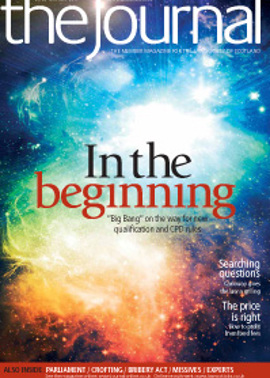Call in the experts

Until a few weeks ago, the expert witness enjoyed an immunity, both north and south of the border. In broad terms, civil proceedings could not be brought against the expert for words spoken from the witness box, or for views or advice expressed in expert or technical reports prepared in anticipation of litigation.
The rule had several justifications. In particular, it allowed the expert to speak freely, thereby assisting the court, and without fear of being sued by a client. This had been the law for over a century, and was well understood (see, e.g. the Scottish case Watson v McEwan [1905] AC 480, applied in B v Burns 1994 SLT 250 and Karling v Purdue 2004 SLT 1067). Yet, with the Supreme Court decision in Jones v Kaney [2011] UKSC 13, 30 March 2011, all that has changed.
Jones was an English appeal, but the genie is out of the bottle, and it will not be long before the issue begins to create interest in this jurisdiction.
Jones was hit by a car and suffered psychiatric injuries. Kaney, a consultant clinical psychologist, was instructed by solicitors to examine and prepare a report on Jones for the purpose of litigation. Kaney opined that Jones was suffering from PTSD. The court ordered Kaney and the expert instructed for the driverÕs insurers to discuss the case and prepare a joint statement under the relevant English rules of court. The experts discussed the case by phone, and Kaney signed, without amendment or comment, a statement prepared by the insurersÕ expert which contradicted the views she had expressed in her report, and was very damaging to JonesÕs case. Kaney claimed the statement did not reflect the discussion but she had felt under pressure to agree it.
Jones settled his claim, but then sued Kaney, alleging that but for her negligence in signing the statement he would have received a larger settlement. Kaney argued that she enjoyed immunity.
The Supreme Court regarded the issue as one of public policy. It held by a 5-2 majority that the immunity could no longer be justified. In the principal speech the President, Lord Phillips, examined the traditional justifications for the rule (such as reluctance to give evidence) and concluded that these were not made out. In essence, the disadvantage to the public in removing the immunity was not such as to justify its retention.
Watson v McEwan is binding on Scottish courts, and the immunity could only be removed by a decision of the Supreme Court, or legislation of the Scottish Parliament. Will Scots law follow the English example? The answer is not obvious. On the one hand, if the Supreme Court has decided that the immunity is outmoded and can no longer be justified, the rationale for retaining it in Scotland is less convincing. On the other, in questions of immunity and public policy, Scottish courts have shown a reluctance to follow their English counterparts slavishly, where reasons of policy demand otherwise (see, e.g. Wright v Paton Farrell 2006 SC 404, retaining the advocateÕs immunity for conduct of a criminal trial, notwithstanding Arthur J S Hall & Co v Simons [2002] 1 AC 615).
Furthermore, the effects consequent on the removal of an expertÕs immunity are uncertain. In Jones, the dissenting speeches of Lord Hope and Lady Hale persuasively urge a cautious approach. As Lord Hope put it: ÒAn incautious removal of the immunity from one class of witness risks destabilising the protection that is given to witnesses generallyÓ (para 130).
Both justices identified potentially far reaching and unpalatable consequences. For example, in cases involving children, where their interests are paramount, is it desirable that an expert should be constrained, when expressing views for the benefit and guidance of the court, by fears of being sued by a disappointed client? And what of the expert appointed by a court or tribunal? Or the witness who is not called as an expert per se but because they possess specialist skills, and who expresses certain views when giving evidence? In other words, for the purposes of the immunity, how is the Òexpert witnessÓ to be identified? Both justices thought it preferable that the matter be investigated by the Law Commission.
What was a settled area of our law has been opened up. It seems probable that civil actions against experts will follow. Standing Watson v McEwan they are bound to fail; but years will pass before that case can be reviewed by the Supreme Court, and meantime much uncertainty and anxiety will be created, not least among the experts on whom we rely to assist our litigations. It would thus seem appropriate, as Lord Hope suggested, for the Scottish Law Commission to carry out its usual thorough consultation. If, in this difficult area of law and policy, there is pressure to update or modify the law, would the debate and consideration that is triggered by a Commission review not be a sensible and logical first step?
In this issue
- Experience not to be missed
- Call in the experts
- Planning to deliver
- Stars of the future
- Registered Paralegal Scheme hits the mark
- CPD: a personal quest
- Wha's like us?
- Holyrood: a verdict
- Public ethos
- Power in name only?
- From the Brussels office
- Minority voices
- Law reform update
- Quinn Direct - when to intimate?
- Name your price
- Ask Ash
- Communication breakdown - a major risk issue
- Interested parties
- Support from afar
- Plus ça change?
- Where the state has to stop
- A NEST egg?
- Scottish Solicitors' Discipline Tribunal
- Website review
- Book reviews
- Above board
- Ruaig an Fhèidh
- The price of breach






